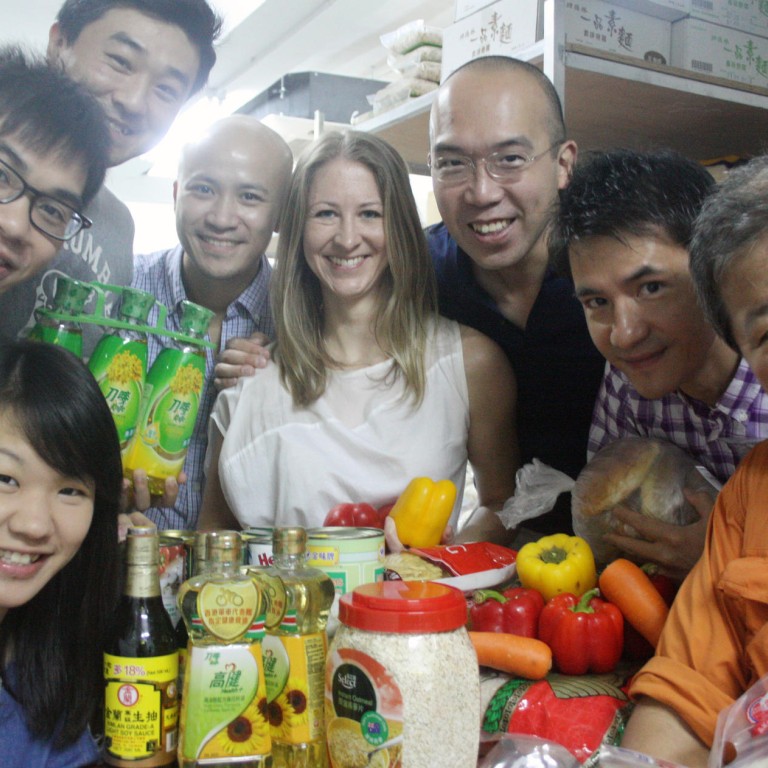
Beating waste and putting food on plates for needy
Philanthropist learned the importance of compassion as a boy, and made this lesson a reality by helping the hungry of Hong Kong
Investor Kevin Yeung Ka-wei is waging a full-on assault in the fight against hunger in the city.
Hongkongers throw away a huge amount of food - while people go hungry - and it creates a huge amount of unnecessary waste. But Yeung saw this as an opportunity to make a dent in the poverty and hunger across the territory through philanthropy.
In 2009, with partners Gabrielle Kirstein and Christina Dean, he co-founded Feeding Hong Kong to feed people in need with surplus food.
Feeding Hong Kong now serves as the city's largest food distribution network servicing 47 smaller local food charities. This innovative charity operates more like a well-run logistics enterprise than a traditional food bank. It works with retailers, distributors and manufacturers to source, collect and redistribute surplus food on a large scale to provide for the charities it services.
Hong Kong is one of the world's glittering financial capitals, but as the cost of living rises so does the pressure on the city's underprivileged. "I started digging deeper with my partners and we realised there really was a huge problem," Yeung said. According to the Institute of Education, about half a million people live in severe poverty - defined as earning HK$3,585 a month or less - and this decides what is on their dinner plate. This number does not take into account the children of families who fall into this category.
Yeung, 39, who made his money as a high-flying banker and industrialist, believes his skills and experience enable him to contribute to society through philanthropy.
He has spent the best part of two decades involved in charity with a long track record in combining food and fundraising. He is chairman of the United Nations World Food Programme in Hong Kong- the largest humanitarian effort that feeds 90 million mouths around the world. Previously, he held a similar role for Unicef. A few years ago he turned his focus back on Hong Kong.
"We started looking at local food banks and we realised they tended to be small and centralised," he said. "They knew their beneficiaries very well, so they knew where the help was needed, but couldn't get a lot of assistance from outside.
"They had to rely on volunteers to give them food and it was very sporadic and unreliable. They had good months and bad months. If you're not collecting enough you can't distribute enough. But there are still families depending on you, and they weren't getting the same amount or much variety."
Kevin and his partners saw the need to collect more high quality food that would otherwise be thrown away, and deliver it to a network of partner charities who provided food to the hungry.
However, the early days of Feeding Hong Kong were not easy for the newcomers in town.
"At first, we started working with food banks, and people were sceptical to the point of being hesitant," he said. "The local charities were also reluctant to receive help from us."
This changed as the organisations saw results.
Now when Kevin sits at the dinner table with his wife and three-year-old son, he is grateful to the indispensable army of staff and volunteers who work with him to collect food every day. Last month the team raised a record 10 tonnes of food from corporate donors - that is 17,000 meals across Hong Kong - to hand to the food banks and charities.
But the food Yeung and his team collects is only a fraction of what is sent to landfill each day. According to the Environmental Protection Department, 3,200 tonnes of food is discarded daily.
For the 300,000 children who do not get three meals a day or the one in three old people who fail to meet their basic nutritional needs, the wasted food could make a huge difference.
Yeung's gives the credit for his involvement with charity to his aunt Dr Barbara Miller, a physician who raised him in the United States, who, he says, showed him the importance of compassion. He was also inspired by paediatrician Robert Fung Hing-piu who was the founder of the Hong Kong Committee for Unicef. Fung died in 2009 at the age of 74 just as Yeung founded Feeding Hong Kong.
"Charity isn't about telling you what to do and you go and do it," Yeung said. "If you are going to support a cause it must be something you believe in, you see what is wrong, and you can help. It might take time, but you make that commitment to do it.
"By the time I decided to commit to this, I already recognised there was a huge problem. I saw poverty in the eyes of the children and the families; I saw the poverty the elderly were living in. I knew it was here, and I knew I could do something," he said.

